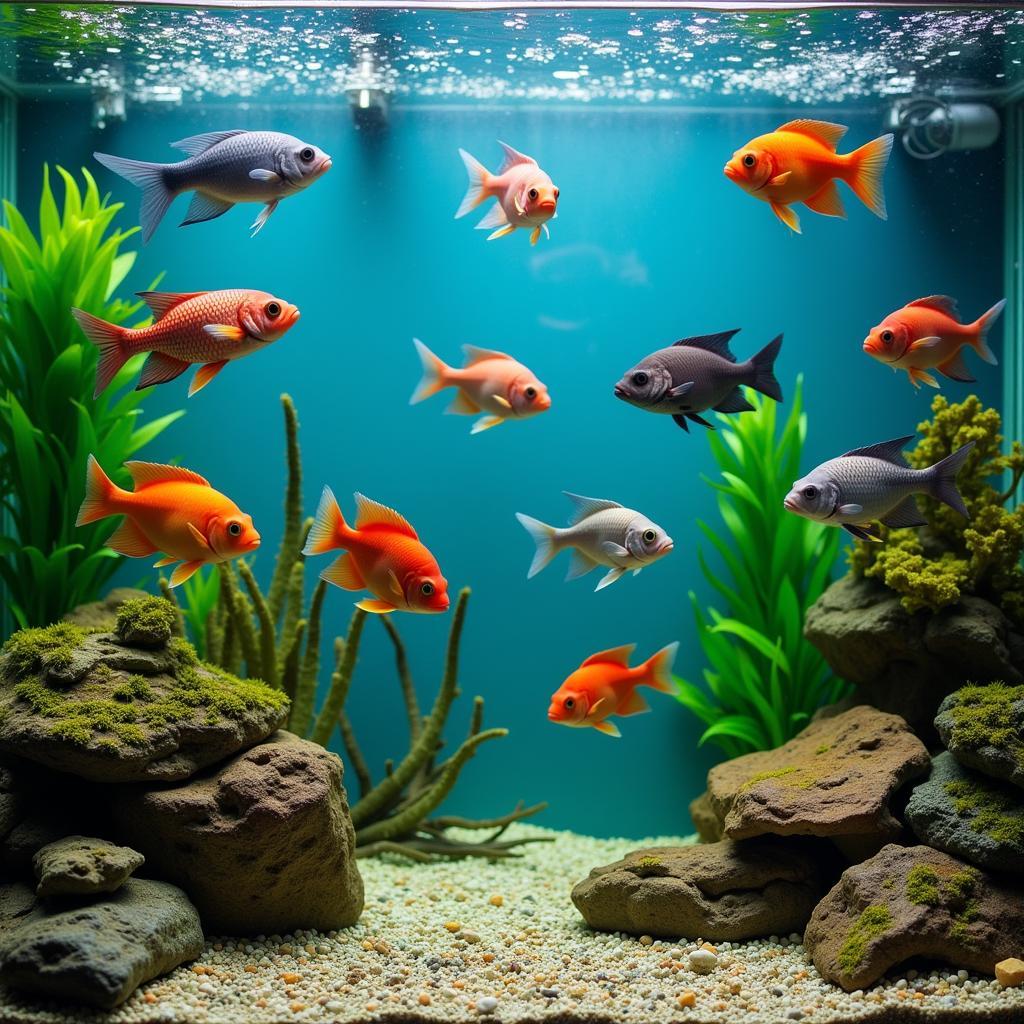Spirulina Fish Food is gaining popularity among aquarium enthusiasts, and for good reason. This nutrient-packed algae offers a plethora of benefits for fish health, enhancing color, boosting immunity, and promoting overall vitality. Let’s delve into the world of spirulina and discover why it’s becoming a staple in so many fish tanks.
The Amazing Benefits of Spirulina Fish Food
Adding spirulina to your fish’s diet can have a dramatic impact on their well-being. This blue-green algae is a powerhouse of essential nutrients, including protein, vitamins, minerals, and antioxidants. These components contribute to improved digestion, stronger immune systems, and vibrant coloration in fish. For those looking to enhance the natural beauty of their aquatic pets, spirulina fish food is a fantastic choice. It’s particularly effective in intensifying the red and orange pigments in fish, making them appear more vibrant and lively.
Fish, much like humans, benefit from a balanced and nutritious diet. Spirulina fish food provides a natural source of vital nutrients, supporting healthy growth and development. This makes it an excellent choice for a variety of fish species, from colorful bettas to active cichlids. What’s more, including spirulina in fish food contributes to a cleaner aquarium environment. Improved digestion in fish leads to reduced waste, promoting cleaner water and a healthier habitat. You might even find your tank requires less frequent cleaning! If you’re seeking a high-quality fish food with spirulina, look for reputable brands known for their commitment to quality ingredients and balanced nutrition.
 Spirulina Fish Food Benefits for Aquarium Fish
Spirulina Fish Food Benefits for Aquarium Fish
Why Choose Spirulina for Your Fish?
What makes spirulina stand out from other fish food ingredients? Its unique nutritional profile is a key factor. Spirulina is packed with essential amino acids, the building blocks of protein, which are crucial for muscle development and overall fish health. It’s also a rich source of vitamins, including B vitamins, vitamin E, and vitamin K, which contribute to various physiological functions. The high antioxidant content of spirulina helps protect fish from cellular damage, boosting their immune system and enhancing their ability to fight off diseases. Furthermore, spirulina is a highly digestible food source, meaning your fish can efficiently absorb its nutrients.
How to Incorporate Spirulina into Your Fish’s Diet
Integrating spirulina into your fish’s diet is easy. You can choose from various forms, including flakes, pellets, and wafers. Select a best flake fish food that includes spirulina, especially if you have smaller fish or those that prefer to feed near the surface. For bottom-dwelling fish, sinking pellets or wafers containing spirulina are a great option. Be sure to follow the feeding instructions on the product packaging to avoid overfeeding, which can lead to water quality issues. It’s important to remember that while spirulina offers numerous benefits, it shouldn’t be the sole component of your fish’s diet. A varied diet is key to ensuring they receive all the nutrients they need.
Is Spirulina Fish Food Right for All Fish?
While spirulina is generally beneficial for most fish species, some considerations are worth noting. Certain herbivorous fish, like certain cichlids, thrive on a diet rich in algae, making spirulina an excellent choice. You can find specific xtreme cichlid food enriched with spirulina. For koi, a popular pond fish, spirulina enhances their vibrant colors, making a hai feng koi food with added spirulina an excellent option. However, carnivorous fish may not benefit as much from spirulina as their primary nutritional needs are met by protein from animal sources. While spirulina can still be a supplementary part of their diet, it shouldn’t replace their main food source.
“Spirulina is like a multivitamin for fish,” says Dr. Emily Carter, an aquatic veterinarian. “It provides a wide range of essential nutrients that contribute to their overall health and well-being.”
Spirulina: A Sustainable Choice for Aquaculture
Beyond its nutritional benefits, spirulina is also a sustainable choice for aquaculture. It can be cultivated using minimal resources, making it an environmentally friendly alternative to some traditional fish feed ingredients. Choosing spirulina fish food can contribute to a more sustainable approach to fish keeping. Another expert, renowned aquarist Michael Davis, adds, “Incorporating spirulina into fish food is a step towards more sustainable and responsible aquaculture practices.”
In conclusion, spirulina fish food offers a wealth of benefits for your finned companions. From vibrant colors to robust immunity, spirulina is a valuable addition to any fish’s diet. By incorporating this superfood into their meals, you’re investing in their health, vitality, and longevity, while also contributing to a more sustainable future for aquaculture. Consider switching to spirulina fish food today and witness the positive transformation in your aquatic pets.
FAQ
- How much spirulina fish food should I feed my fish?
- Can I overfeed my fish with spirulina?
- Is spirulina suitable for all fish species?
- What are the different forms of spirulina fish food available?
- Where can I buy high-quality spirulina fish food?
- How does spirulina contribute to a cleaner aquarium?
- Can spirulina help prevent diseases in fish?
For further assistance, contact us at Phone Number: 02437655121, Email: minacones@gmail.com or visit our address: 3PGH+8R9, ĐT70A, thôn Trung, Bắc Từ Liêm, Hà Nội, Việt Nam. We have a 24/7 customer service team.